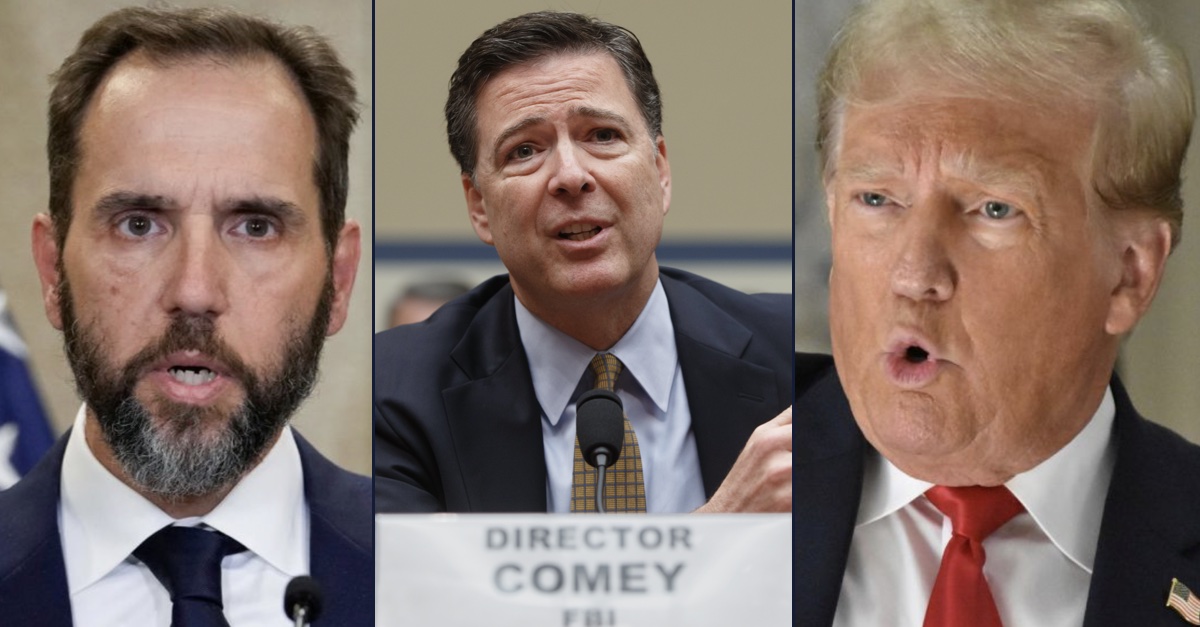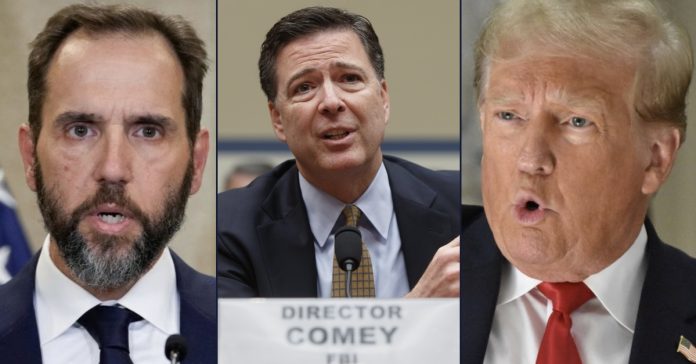
Jack Smith (AP Photo/J. Scott Applewhite), James Comey (AP Photo/J. Scott Applewhite, File), Donald Trump (Photo by Kyle Mazza/NurPhoto via AP)
In court for a scheduling conference Friday, special counsel Jack Smith responded to arguments by Donald Trump’s defense that the Department of Justice’s Mar-a-Lago prosecution is improper by virtue of being too close to the 2024 election, in violation of DOJ’s own rules.
The special counsel told U.S. District Judge Aileen Cannon that Justice Manual § 9-85.500 — the DOJ’s internal policy and procedure on protecting government integrity by avoiding “Actions that May Have an Impact on an Election” — does not apply to Trump since he was indicted back in June 2023, well outside of the timeline of the so-called “60-day rule.”
In a Thursday defense filing with a proposed schedule, Trump attorneys argued that the Mar-a-Lago case should be delayed until after the election, as the July 8 trial date proposed by Smith would “violate Justice Manual § 9-85.500.” Notably, the filing referenced the DOJ inspector general’s report on former FBI Director James Comey’s well-documented “mistakes” in — and mishandling of — the Hillary Clinton private email server probe, whether months before the 2020 election or two days before Clinton lost.
As the OIG report said at the time, in part on Comey:
We found no evidence that Comey’s decision to send the October 28 letter was influenced by political preferences. Instead, we found that his decision was the result of several interrelated factors that were connected to his concern that failing to send the letter would harm the FBI and his ability to lead it, and his view that candidate Clinton was going to win the presidency and that she would be perceived to be an illegitimate president if the public first learned of the information after the election. Although Comey told us that he “didn’t make this decision because [he] thought it would leak otherwise,” several FBI officials told us that the concern about leaks played a role in the decision.
Much like with his July 5 announcement, we found that in making this decision, Comey engaged in ad hoc decisionmaking based on his personal views even if it meant rejecting longstanding Department policy or practice. We found unpersuasive Comey’s explanation as to why transparency was more important than Department policy and practice with regard to the reactivated Midyear investigation while, by contrast, Department policy and practice were more important to follow with regard to the Clinton Foundation and Russia investigations.
Trump lawyers contend that Jack Smith is also disregarding DOJ rules, this time impermissibly impacting the 2024 election. The Justice Manual section the Trump team referred to states that federal prosecutors, like Smith, and federal agents “may never select the timing of any action, including investigative steps, criminal charges, or statements, for the purpose of affecting any election, or for the purpose of giving an advantage or disadvantage to any candidate or political party.”
From the defense:
Given President Trump’s status as the presumptive Republican nominee and President Biden’s chief political rival, a trial this year would also violate Justice Manual § 9-85.500, which applies to the Special Counsel’s Office, and prohibits “Actions that May Have an Impact on an Election,” as well as established DOJ norms that former officials described—when talking about Hillary Clinton rather than President Trump—as consisting of “a general principle of avoiding interference in elections.” In fact, in November 2020, when Deputy Special Counsel J.P. Cooney and his colleagues were seeking to forestall valid investigations of election fraud that supported President Trump’s position regarding the 2020 election, he sent a letter to then-Attorney General William Barr invoking DOJ’s “longstanding policy of non-interference in elections,” which he wrote had been in place for “decades” and “protected the institution from the appearance of political partisanship.”
The Special Counsel, Deputy Special Counsel Cooney, and their staff now act contrary to these authorities, with the, politically based and calculated, support of the Biden Administration and Attorney General Garland, by seeking to rush this case to trial on a schedule without precedent in any other prosecution that involved the nature and extent of the Espionage Act charges, CIPA litigation, and classified discovery in this case.
As Lawfare’s Anna Bower reported, Jack Smith on Friday told Judge Cannon that there is no issue with his proposed pre-election trial date because the case was charged in June 2023, several months in advance of the primaries and outside the “60-day” window.
In other words: The special counsel doesn’t think the “60-day” policy would preclude a potential Trump trial in the run-up to the November election. https://t.co/cGf2NrbSvR
— Anna Bower (@AnnaBower) March 1, 2024
BIG news out of Ft. Pierce:
The DOJ advises Judge Cannon that the “60-day rule” does NOT apply in Trump’s case as he has already been indicted & the case is already being litigated.
So, no reason to delay taking him to trial, even with elections in November.
— Katie Phang (@KatiePhang) March 1, 2024
Law professor and former federal prosecutor Randall Eliason, for one, said that Smith was “clearly correct” on this point.
Yes, this is clearly correct. https://t.co/p8Aj5agJh1
— Randall Eliason (@RDEliason) March 1, 2024
MSNBC legal analyst Joyce Vance, a former federal prosecutor herself, went a step further and called Trump lawyers’ argument “dead wrong.”
Read the policy for yourself-it doesn’t apply after a case is indicted, when the judge, not DOJ, is in charge of the schedule. Trump’s lawyers got it dead wrong. I explain about midway down here: https://t.co/qXXSrvl6of https://t.co/OyqVbHXInF
— Joyce Alene (@JoyceWhiteVance) March 1, 2024
Vance elaborated on her Substack, “Civil Discourse,” as follows:
If you look carefully at the language, you will see that it applies to decisions by the government about the timing of steps in a criminal investigation that could lead to it becoming publicly known an individual is under suspicion (like executing a search warrant) or scheduling an indictment close to an election. The provision forbids prosecutors from scheduling overt actions like this for an explicit political purpose, but in practice, prosecutors avoid doing it at all, in order to avoid any appearance of impropriety.
But this provision doesn’t cover what happens to a case after it’s indicted. Section 9-85.500 is about timing decisions that prosecutors control, and once a case is indicted, the schedule is up to the judge. It’s no longer a matter where DOJ has control over when things, like trials, happen. It’s in the hands of the courts, an independent branch of government, and the schedule is dictated by rules like the Speedy Trial Act and the judge’s discretion. Trump’s argument here doesn’t make sense if you stop and think about it—if it were correct, there would never be a moment when the government would have enough time to investigate, indict, and try a case given our election cycle, and politicians could never be held accountable.
Even if Smith isn’t violating any DOJ rules, however, getting a July 8 trial date from Cannon seems to be “unrealistic,” since that is the word the judge used to describe the proposal.
Update from Ft. Pierce: Judge Cannon did not set a trial date for the classified documents case during the morning session of the scheduling conference.
But she told prosecutors for the special counsel that their proposed July trial date is “unrealistic.” https://t.co/lU6meGaUmI
— Anna Bower (@AnnaBower) March 1, 2024
Have a tip we should know? [email protected]

